#Minoru x Yutaka
Explore tagged Tumblr posts
Text
Two characters bursting out laughing after delivering the most romantic scene I have ever seen in my entire life.
Them: omg that was not romantic at all lmao
Me: *in tears and violently shaking* SHUT THE FUCK UP YOU LIARS
#our dining table#yutaka x minoru#minoru x yutaka#our dining table ep9#WUAAAAAHAHAHA I WILL KILL FOR THEM I WILL KILL FOR THEM#I SWEAR TO GODDDDD#THEY CAN'T KEEP DOING THIS TO MEEEEEE
1 note
·
View note
Text
I’m seeing various reactions to the “spinoff” bonus episode of Bokura no Shokutaku/Our Dining Table and it made me want to write about how I see the episode as a very logical continuation of the two leads’ character arcs.
I’ll talk about Yutaka first because his explanation is a bit simpler, although the feelings involved are intense as hell. Yutaka is so afraid that he’ll lose the people he loves most that the fear can become a defeatist belief: “I will lose the people I love most.” I wrote about this in some of my posts about The Eighth Sense. Human beings have a capacity to believe distorted things after trauma and loss. Especially negative beliefs about ourselves or pessimistic beliefs about our prospects in life.
Yutaka doesn’t fully believe this all of the time. But I would expect, based on his experiences and the fears he showed in the last episode of the main series, that a fear of this sort gets activated in Yutaka sometimes. Sometimes fears show up as highly negative, maladaptive beliefs that we try to test and hope to disprove but continue to find compelling (I have an unfinished novel-length Utsukare post that gets into this idea more). So, yeah. Yutaka has been primed for this fear of abandonment for a very long time.
What about Minoru? He’s never been jealous before. But what was his biggest stumbling block in getting together with Yutaka? Internalized homophobia. And it didn’t magically disappear when they got together (though over time and under the right circumstances their relationship could play a part in helping him to heal from it).
When Minoru first kisses Yutaka, he assumes immediately afterward that it was unwelcome. It seems like anything short of Yutaka grabbing him and kissing him back enthusiastically right away was going to be interpreted as a rejection. He doesn’t ask Yutaka how he feels about him or if he's interested in a relationship when they meet at the cafe. It would have helped if Yutaka could have been more forthcoming that night. But Minoru basically rejects himself on Yutaka’s behalf without checking with him at all. And though Yutaka isn't clear about returning Minoru's feelings, he does give some subtle signals. And he definitely never says he doesn't return them. It’s absolutely heartrending to watch. Worse, Minoru doesn’t just assume Yutaka doesn’t return his feelings. He assumes that the kiss was upsetting to him and that Yutaka will never want him to touch him again.
Why does he do this? It’s never stated directly, but I think it’s pretty obvious that it’s because of internalized homophobia. Similar things happen in other BLs. Take Togawa’s abject apology after kissing Nozue in Old Fashion Cupcake, for example, which makes the internalized homophobia piece more explicit through his various references to what’s “common sense” or “normal.” Plenty of LGBT+ folks also have personal experience with this, of course. Internalized homophobia makes it seem as if our feelings, overtures, etc. are bound to be unwelcome and even repulsive to the other person. And this isn't just, like, irrational insecurity. Often it's informed by actual experiences with rejection that have the added knife-twist of expressing stigma or disgust. But you don't have to have gone through that kind of rejection to have a vivid mental image of what it would be like and to convince yourself it's likely to happen to you.
When Minoru sees Ohata’s text on Yutaka’s phone, there's a reason that the idea that Yutaka would two-time him with his coworker and eventually dump him for her seems likely. It's not because Minoru distrusts Yutaka. It's not because of anything about Ohata (well, not unless you count her gender). There may be some garden-variety insecurity at play, like thinking he won't be able to hold on to Yutaka because he isn't good enough or something. But the biggest factor, I'm pretty certain, is that same type of internalized homophobia. After hearing from Yutaka that he likes him back, wants to date him, wants to be with him forever and be a part of his family, after kissing each other and cuddling all night and whatever else has happened between them in the interim, it still seems plausible to him that Yutaka might split the moment he gets a chance to be with a woman. I don't know what's sadder, the fact that he feels this way and a lot of viewers will be able to relate, or the fact that he's not entirely unjustified because there are people who totally behave that way.
Add to all this the fact that just when each of them is feeling insecure in their particular way, the other one starts acting tweaky, and the misunderstanding makes a good bit of sense. I think for a lot of folks this aspect of the episode is uncomfortable. And that's just part of seeing this couple we've been rooting for have this rocky interaction on what ought to be a special day. But I also wonder if some of the bigger sources of pain that these fears touch on--fear of loss (with unresolved mourning for past losses) and internalized homophobia (with all of the deep-down self-hatred that implies)--come through in one way or another and are really hard to sit with.
But I think the fact that they are able to work through it matters. It shows that while these problems didn't go away just because they got together (which wouldn't be satisfying anyway because it would be unrealistic), but there is good reason to hope that they will get better if they keep communicating and supporting each other. That's very consistent with the style the show has had from the beginning, and that so many of us love.
#bokura no shokutaku#minoru x yutaka#psychology of bl#internalized homophobia#fear of loss#our dining table
14 notes
·
View notes
Text
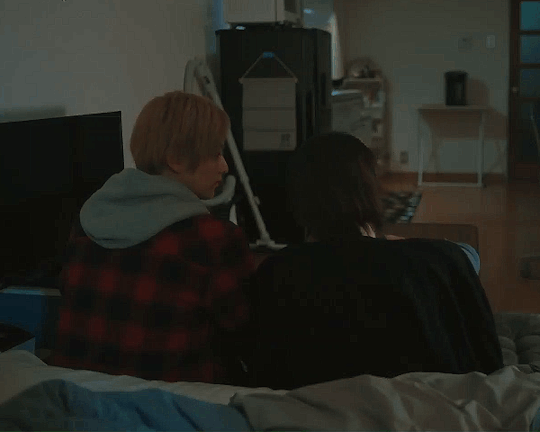
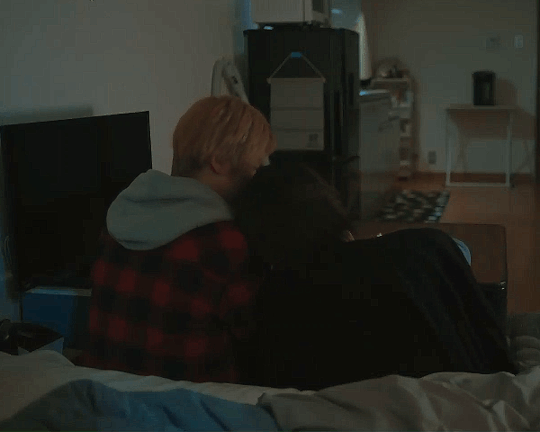
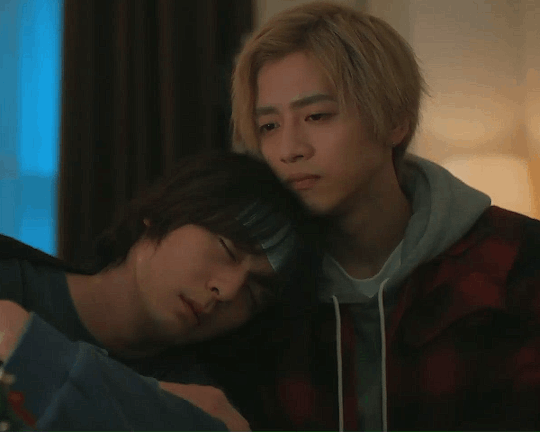
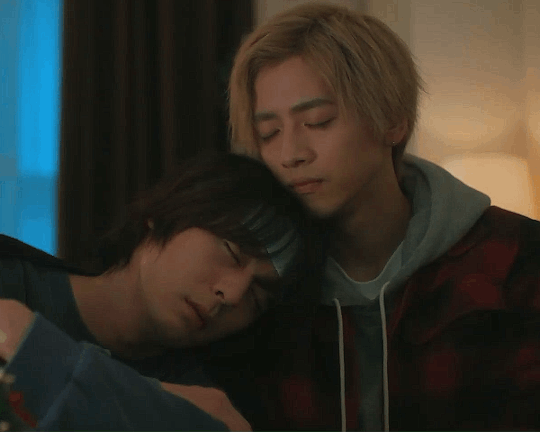
I had to sleep here alone, so I got a little lonely.
#our dining table#bokura no shokutaku#minoru x yutaka#ours#by esme#gifs#japan#ueda minoru#hozumi yutaka#tobelle#lextag#usermare#userbon#mjtag#userjap#userkimchi#userstorge#connorjesup#userginpotts#tuserrowan
137 notes
·
View notes
Text


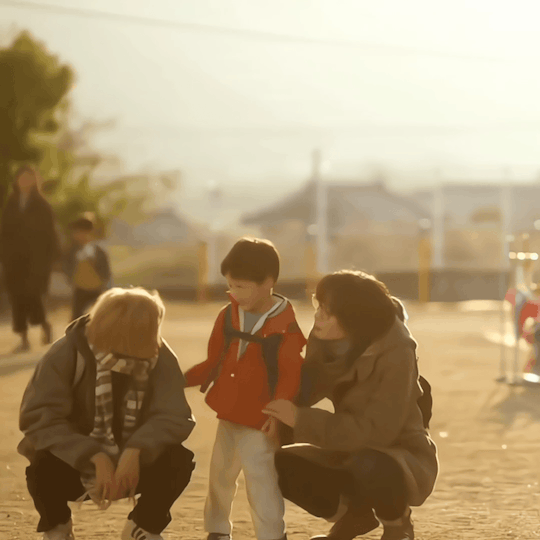
"From now on, let's stay together like this forever. Let's eat together and live our lives together forever."
#minoru x yutaka#lq gifs#our dining table#bokura no shokutaku#they're my family#tane has two brothers now i'm sobbing#shout out to minoru's dad for being parent of the year#thank god they're having a special episode otherwise i would be more of a mess rn because i wont see them again#i love found family trope so much#i'm so emotional because even if yutaka was able to somewhat fix his relationship with his brother i'm so glad he found a family and a home#that makes him feel so loved and special
25 notes
·
View notes
Text



If there's something bothering you, I want you to talk to me. It's about the two of us. We should think about it together. Okay. Thank you, Minoru.
BOKURA NO SHOKUTAKU (2023)
#bokura no shokutaku#our dining table#minoru x yutaka#userdramas#jdramasource#asiandramasource#dailyasiandramas#japanese drama#boyslovesource#esmetracks#lextag#connorjesup#userstorge#userbon#userkimchi#usermare#userginpotts#belleparkgif
717 notes
·
View notes
Note
More importantly!!!
How are you feeling about the Our dining table SPIN OFF EPISODES !???????
Well, Anon, considering the red and blue are dating now


I'M ELATED! They aren't really red and blue, but indulge me.
We started with Tane being the binder between Minoru and Yutaka.

And ended with Minoru and Yutaka getting closer without Tane.

So to get Tane going on a birthday trip with his dad, his brother, and his best friend is more than I could ask for. Mostly when his brother and his best friend are finally together on the same side.

To think that there was a moment when they were across from each other with so much space and love between them.

And now they are consciously making the decision to be right next to each other, sharing space and love.

We don't deserve anything else from Our Dining Table, so the gift we are being given makes even my icy heart warm over. Koji and his three sons won me over and will forever rest in my heart.

#our dining table#our dining table special episode#bokura no shokutaku#We don't deserve Koji and his three sons#Minoru x Yutaka#They closed the space between them and filled it with love
88 notes
·
View notes
Text




They held hands in the dark and held each other and they found love worth risk, love worth fear, love worth holding on.
(It's about hesitance that becomes bravery, fear that becomes love, friendship that grows, affection that becomes romance.)
#our dining table#yutaka x minoru#minoru x yutaka#japanese series#jdrama#japanese bl#bokura no shokutaku#bl series#bl drama#asianlgbtqdramas#asian lgbtq dramas#japanesebl#bl japan#bl jdrama
181 notes
·
View notes
Text
Friends. It’s been a HELL of a week, no? For those of us watching BOTH the Our Skyy 2 x Bad Buddy X ATOTS episodes AND Our Dining Table (AND STEP BY STEP RETURNS NEXT WEEK, FUCK). I mean. I had purposely NOT taken on new shows to hoard my mental health resources to handle Our Skyy 2/BBS/ATOTS, but I give up, I’m just a bowl of cocktails, melted ice cream, and mental tears.
I held off on watching Our Dining Table, episode 9, until today to recover from episode 2, part 4/4, oh holy Jesus of Our Skyy 2/BBS/ATOTS this week, but I’ve caught up on ODT, so here we go.
The dearest wonderfriend @lurkingshan wrote a fabulous piece about the family dynamics at hand in the meeting between Yutaka and his adoptive family. Everyone knows now that that wasn’t in the manga, and I want to take a few guesses as to why it was included in the screenplay.
I haven’t plunged into the tags as much as Shan, but it seems like some folks may think that Yutaka misjudged his adoptive family as he grew up. I’m more interested in the why of that, and Shan certainly touches upon it as an effect of Yutaka losing his parents so young. We know Yutaka has a fear of abandonment. It’s how it gets expressed that’s affecting his whole life -- including, in the words of @wen-kexing-apologist, the LONG FUCKING PREGNANT PAUSES (lol).
Yutaka was so shattered by the initial behavior of his adoptive brother when he was first taken in -- after his parents died -- that he utterly retreated into himself, and COULD NOT SEE the subtle changes of Yuki Oniisan over the course of the rest of their childhoods, as Yuki tried to reach out. Yuki ended up thinking that that was the way Yutaka just was, when in fact, this was Yutaka’s protective shield.... a sheild that ended up being mostly who Yutaka ended up being as an adult anyway.
I absolutely LOVED seeing this motif being played out in a non-canon scene, LOVED IT. I LOVED how that scene was set up, with almost HOSPITAL-LIKE lighting, SURGICAL lighting, COLD and white (yuuki means snow, funnily enough EDITING TO CORRECT, thank you to @sliceduplife for correcting me because I was only hearing “yuuki” by sound, and the kanji of his name actually means courage + tree, so please ignore the snow comparison to the lighting!) -- while the flashback to Minoru and Tane was full of warm, yellow, sun-like light.
This was an EXAMINATION of Yutaka’s mind and heart. After talking with his adoptive family, Yutaka realized his perspective and perception was off. He’s missing subtle details about his interactions with people. His shield is SO strong that he missed fully embodying HIS OWN FEELINGS FOR MINORU -- even though, as he says to Minoru in the playground, that he KNEW what those feelings were. He just didn’t know how to act on them.
And we’re going to see, in the final episode, another instance of this, another experience of a feeling that Yutaka hasn’t had before, but one that he KNOWS HE NEEDS TO FEAR, because he lost his parents. Now that he has something GOOD -- he knows there’s a chance he’ll LOSE IT. And as friends like @respectthepetty and @troubled-mind have noted, the last episode will feature Dad Ueda-san in a turn that will not disappoint regarding this.
But now, this fear of LOSS. Y’all and me -- we all know people, and/or we are these people, that always have something on our minds that we’re anxious about. I’m that kind of person -- I don’t feel normal if I’m not stressed about something. I just bet that this is Yutaka’s defense mechanism against any more pain, and what we’re witnessing is the embodiment of it.
Y’all know this by now since I’m late in writing this, but next week’s episode is gonna be emotionally EVERYTHING, so get your tissues ready. I, for one, am definitely not ready, and he has a lot to do with this, so yes, I DO blame Aof Noppharnach for cliffhangers AGAIN airing his damn Our Skyy shows while the best BL airing right now is ending. COME AWN, AOF!
#this post was sponsored by kleenex#our dining table#bokura no shokutaku#minoru x yutaka#yutaka x minoru#inukai atsuhiro#iijima hiroki
36 notes
·
View notes
Text
Our Dining Table: Costuming Analysis
Alright…week 3..4?? of me begging you to watch Our Dining Table. No spoilers in this one, I actually wanna talk about one of my favorite underrated things in TV shows…wardrobe and costuming.

I’m going to be focused on the wardrobe of Minoru and Yutaka, but I’ll also touch on Tane and Koji (who I may also call Papa).
Wardrobe is one of the most fascinating things to me about film and television, but it is especially important in television (I think) because TV shows more often show a day-to-day story. There may be time jumps, but in general you’re following these characters through daily life. Character costuming is intended to not stand out unless that’s the point (see Tankhun) but instead add additional dimension to each character and enhance the information being presented by the script, actors, and director.
Looking at Yutaka first, what we know about Yutaka is that he is fairly simple, not very gregarious, quite kind, and from a monetarily privileged upbringing. He works a steady job, I would imagine likely has a college degree, and while he may be a mid-level employee, he’s probably making a decent salary. His clothing you see throughout the show is often simple, we don’t see loud patterns or a lot of color, he generally sticks with neutrals across the board, which makes it simpler for him to build perfectly fine outfits. His clothing is generally very neat, seems to most often be natural fibers, making it comfortable to an extent. It also appears to be more on the expensive end, not designer, but not Walmart.

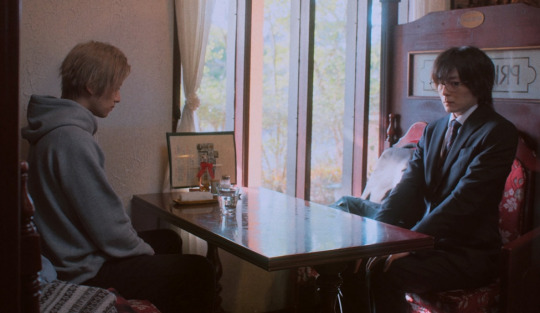
So, what does this tell us about Yutaka? He’s not really interested in appearing fashionable, his clothing allows him to blend in, not be noticed, which we’ve seen is kind of his preference. He takes pride in looking well put together but doesn’t necessarily want to put in a large amount of effort. The natural fibers tell us that comfort matters a bit more than style, but also that he’s not going out of his way to buy something markedly expensive. Touching back on the expense, with his history and being from a fairly privileged family, my interpretation (which is based on experience with friends) is that he’s not seeking out buying expensive clothing for prestige, but more just shopping at the stores he’s used to going to, the stores his parents would have taken him to. A secondary benefit is that he’s buying higher quality clothing that with care is going to last him a fairly long time, which means less having to shop for replacements.
Moving to Minoru, but also the Ueda family as a whole. They’re clearly a working-class family, but may not be financially struggling, but more just coasting to a certain extent. The family as a whole wears some brighter colors, mostly Tane by the simple fact that he’s a child and children’s clothing is often colorful. I’m not going to say their clothing is unfashionable, because that’s too much of a subjective term, but more I’ll say that it’s serviceable, especially the adults. Papa and Minoru both wear comfortable basic clothing items, rarely anything ‘fancy’. We don’t see slacks, or neatly pressed clothing, just comfortable basics. Minoru tends to stick with cargo pants, jeans and sweats, with cotton t-shirts and hoodies. Any of these items could be looked at and seen as well used, or possibly even purchased secondhand. In Minoru’s case specifically, it’s likely that much of the clothing is pieces he’s had for several years, as he’s a young adult and isn’t having to purchase new items to accommodate for regular growth spurts.

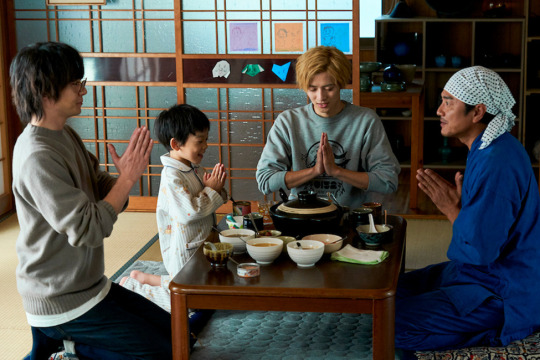
So, what does this say about Minoru? Comfort is high on his level of importance with his clothing. While his clothing is always clean, not in need of repair, or clearly mended, which indicates that he takes care of his clothes, but also doesn’t feel pressed to make a single item last as long as possible. Again, with the natural fibers, which promotes the individual comfort of the wearer, but also conveys a sense of comfort and softness to the viewer. We’re far more likely to think of someone as comforting wearing a soft, worn sweatshirt versus an itchy wool sweater. By their ages, which are fairly similar, we do also see Minoru looking slightly more juvenile, which could be indicative of him continuing to wear clothing from his teen years because it’s still in perfectly good condition for wear. What look to be the newest items he wears are his coats and jackets and his uniform at the ramen shop, which you can attribute to a combination of outerwear generally being worn less often, meaning less wear and tear, and the likelihood that his uniform is provided by his employer, and therefore replaced whenever it’s worn to a point where they deem it unwearable.

Looking at Tane, his style matches that of his father and brother in that he’s seen wearing very comfortable clothes. There’s occasionally some mismatching going on, which for his age (I’m guessing around 6) could be just because he’s dressing himself or because Minoru and Papa don’t care if he’s mismatched…or both honestly. His clothes, noticeably to me, look to be slightly better quality than what we see on Minoru. They also obviously look newer, but Tane is likely only just getting to the stage where his growth has plateaued to the point that he might wear out an item of clothing before he grows out of it. I also don’t see much cohesion in the styles or themes of his clothes, which to me implies that they’re letting Tane pick a lot of his clothing in the store, versus them picking it out. Generally, when parents purchase clothing for their kids, they stick to the colors and styles that they themselves feel comfortable in. Going off Minoru that would mean Tane in sportswear like sweatshirts, track pants, etc.; maybe jeans but with limited funds, items with more give, would be preferable. Tane also has some ‘nicer’ clothing as well, not necessarily formal, but whatever the child equivalent of business casual would be (I would call them church clothes).
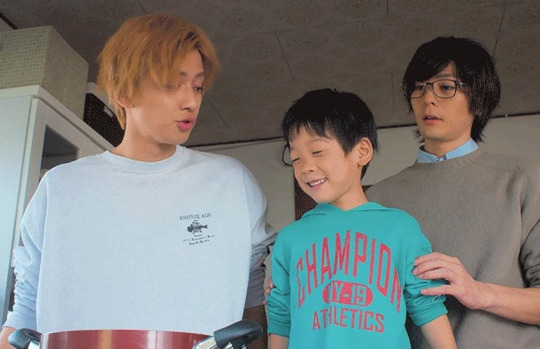
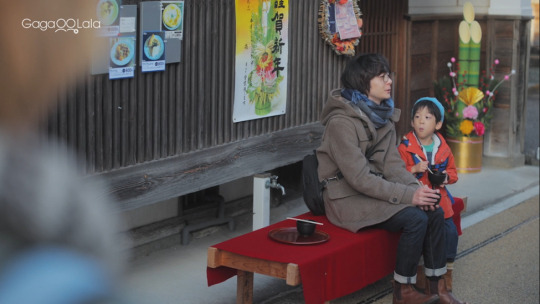
So, what can we read from Tane’s clothing? It’s in good condition, fits well, contains a few what I would call department store pieces, which are slightly more expensive than what we see on Minoru and Papa. This indicates he’s well cared for and that new good quality clothing for him is prioritized over other members of the household. The mismatching, and not so cohesiveness of the wardrobe overall indicates that he’s probably allowed to pick his own clothing and outfits regularly. In some cases, combined with other things, this could indicate lack of adult involvement, but here it’s mostly likely meant to imply that Minoru and Koji are encouraging Tane’s independence, and helping him learn to be self-sufficient (which is in line with general cultural norms of Japan).
Papa, or Koji, now we get to a little more fun. Of all the characters, Koji’s wardrobe and costuming is the most interesting to me and generally the most interesting to look at. His wardrobe, like the rest of the Ueda family is comfortable, well-worn, but also includes far more traditional Japanese cultural pieces than Minoru and Tane, who wear majority 'western’ styles. His clothing is often mismatched outside of the occasions where we see him wearing a full outfit. The styles we see of western clothing is along more classical lines, as opposed to ‘trendy’ pieces.


Looking at what this information is meant to impart, we see some repetition of course, the desire for comfort over being fashionable, serviceable clothing that shows wear as well as care. The inclusion of traditional Japanese clothing pieces emphasizes the generational divide, but also I think serves as an intentional counterpoint to Papa’s clearly accepting nature. As this is a queer story, the audience would have some concern over the possibility of him not accepting Minoru and Yutaka’s relationship. The mismatching outside of full outfits that don’t require decision-making to match, tells us that Koji doesn’t particularly care about looking ‘good’ especially while at home, as we actually only see him in the Ueda house. The classic styles of his western clothing I think serve a two-fold purpose. The most important is I think an indication of how he is able to be both traditional and modern in his mindset. He can respect and appreciate the traditions and styles of his culture and want to keep those alive without perpetuating outdated discrimination. A common phrase you see in the western vintage clothing community is “Vintage clothing not vintage values”, which I think gets my point across a little better and definitely more succinctly. The second purpose is that it makes it difficult to determine when a piece would have been bought. Take the polo shirt he’s wearing- the viewer would have no way of knowing if it was purchased in 1984, 2006, or 2019 outside of physically inspecting it (and having a remarkably in-depth knowledge of polo shirts). We also wouldn’t know if it was purchased new, at a discount shop, or second-hand.
I’m going to make a brief stopover to talk about Yutaka’s adoptive family, just to give some context. All dress very similarly to Yutaka, expensive, higher-end clothing, but not ostentatious. They follow a similar muted color palette of mostly neutrals as well. I would note that Yuki’s clothing is more well-fitted than Yutaka’s perhaps not tailored, or not always tailored, but probably actively tried on in stores where Yutaka would likely just buy the size he knows usually fits and if it’s a little loose who cares. Bottom line is Yuki is a man who strikes me as someone who knows what his inseam length is while Yutaka may not even know what an inseam is.
The Evolution of Yutaka’s clothing through the series

Yutaka’s sense of fashion doesn’t necessarily change, but you can see a progression in him through his clothing. We get a sense of two Yutaka’s in the beginning: work Yutaka and off-duty Yutaka. His work attire is as expected, your standard salaryman suit with an assortment of bland ties. Occasionally he wears a sweater as well, which makes sense as it’s winter. Off duty Yutaka wears jeans, though nice ones, not worn, no decorative rips, with sweaters and occasionally a button-up as well. We only see him in ‘comfortable’ clothing at home. The first time Minoru sees him in ‘comfortable’ clothing is episode 5, when Tane spills something on his shirt and Minoru gives him a sweatshirt to wear. Seeing Yutaka in that style of clothing is him becoming more comfortable with Minoru. He’s okay with Minoru seeing him at ‘less than his best’. We see it again in the next episode with Minoru coming to take care of a sick Yutaka at his home.


The ‘comfy’ clothes indicate Yutaka’s willingness to be vulnerable in Minoru’s presence. We also see a progression from mostly blacks, whites, and greys to more colors. We start with blue, which makes sense to me, as it’s not outside of Yutaka’s comfort zone, but it’s also a color we see a lot of in the Ueda house. This is a visual indication that Yutaka is not only welcome there, but fits in. He can belong there. I feel it also shows Yutaka becoming a bit braver over the course of the show as well. In our most recent episode, we see our biggest leap-- THE YELLOW SWEATER.
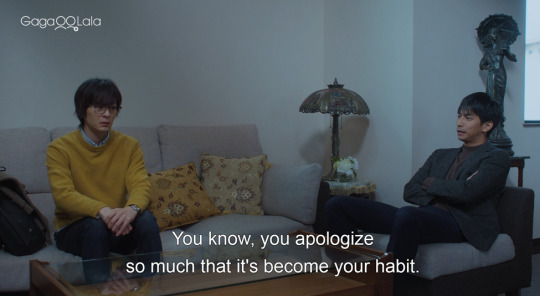
Interestingly he wears this sweater to his parent’s house. Seeing him in that space…he doesn’t fit in there anymore. That house is all cool-tone neutrals, but that’s not Yutaka anymore. He’s come to life. And do we even need to talk about the metaphor of him taking off the neutral greige jacket and showing that sunshine yellow underneath? Right before he reveals to his brother that he’s found his place, that he’s found himself??? He’s not going through the motions of trying to fit in, he’s not attempting to blend into the background. Oh! It’s beautiful!! Not to mention we see Tane in yellow throughout the show, which I believe makes the yellow sweater a little bit of a nod to Tane’s youthful kind spirit helping bring life to Yutaka.
In a final wrap up I want to discuss what is one of my favorite things to see in serialized television and that is outfit repeating…or at least clothing pieces repeating. It’s not something you see a lot of in television, though you see it more in long running or serialized television in the west, because wardrobe and costuming can be expensive. But I specifically appreciate it when you’re dealing with working-class characters. It’s impractical for a character who supposedly depends on their job to live to have an entire new outfit every single day. Having limited wardrobes for characters and showing items worn repeatedly adds to the realism of a show. It also enables you to add personality. As in real life a character would wear their favorite items of clothing a bit more often. We see Yutaka repeat whole outfits, which probably means that he’s not really thinking about making unique fashion choices, but instead just knows what goes together to look presentable. With Minoru you see different items of clothing repeated but never a whole outfit (outside of his work uniform). But you also don’t see anything that looks contrived or like an attempt at a fashionable or cohesive outfit, which indicates a lack of concern about fashion, but also a lack of concern of other’s perception. He doesn’t care what other people think about the way he dresses; it just isn’t something that has occurred to him at all.
Well, I hope you enjoyed. I don’t know if this will have encouraged you to watch the show, but I certainly hope you will.
NOTE: Many pics were pulled from various posts here, and I wanted to give credit. Link 1, Link 2, Link 3, Link 4, Link 5, Link 6, Link 7, Link 8, Link 9, Link 10, Link 11, Link 12, Link 13, Link 14
#Our Dining Table#yutaka x minoru#minoru x yutaka#bokura no shokutaku#Our Dining Table Meta#Wardrobe and Costuming#This post is 2300+ words#Japanese BL
78 notes
·
View notes
Text
Me: Oh my god they're wearing their stupid scarfs I hate this so much
Also me: *big ass dopey grin giggling, blushing, kicking my feet* *screenshots every frame*
0 notes
Text
I'm so deep in my Our Dining Table Bullshit that I'm not sure I'll ever come out of it.
There was
So
Much
SILENCE
Seriously, the pauses in this episode were pregnant with twins.
There was always just enough silence for Yutaka to think but not speak and just enough silence for Minoru to spiral deeper in his fears about making Yutaka uncomfortable and interrupting whatever words Yutaka would ever possibly try to say. For those who have read the manga, the way that Minoru is so scared about making Yutaka uncomfortable, so scared about ruining this safety that he has built with Yutaka (thanks to @isaksbestpillow for ruining me with that translation in her subs), so scared about losing all this warmth and fullness that Minoru has finally been able to feel after losing his mother that he tries to break his own heart is such a phenomenal set up to the parallel we will have with Yutaka's fears later on. Minoru tries to distance himself from the potential heartbreak that comes with Yutaka's silence. He tries to break his own heart while the wound would not be too deep, where the relationship they had in maybe salvageable.
And the only thing Yutaka ever says to Minoru this entire episode is "Minoru?" and "No, I'm fine," And he is fine, he is completely fine, but even though Minoru is looking at Yutaka, he is so caught up in his fears about everything he has possibly just lost because he couldn't contain himself. Because he altered their relationship by kissing Yutaka that MINORU. CAN'T. SEE. IT.
When Minoru says "I wasn't going to tell you any of this. I knew you would be uncomfortable" he can't see all the words that are spinning around Yutaka's head when Yutaka inhales. He can't see Yutaka fail to find the words he needs to say, fail to figure out where he needs to start in all of this, and he fails to see that with Yutaka's exhale, Yutaka is giving up everything he wants to say.
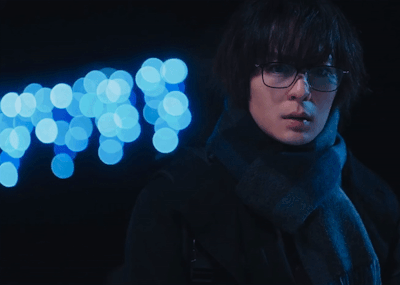
gif by @laowen
Minoru is so focused on getting that last touch of their hands, so busy promising Yutaka this is the last time they will ever touch, so then they can be friends, and they can go back to how it was, and Yutaka won't have to feel uncomfortable knowing that Minoru likes him, THAT HE FAILS TO SEE HOW MUCH YUTAKA'S THUMB IS TWITCHING.
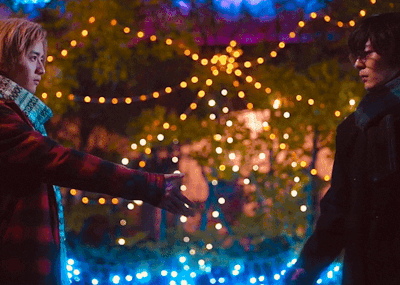
gif also by @laowen
Yutaka wants to reciprocate physical touch, physical intimacy with Minoru so badly. But Yutaka has to process everything. Yutaka is a) in shock and b) having so much trouble figuring out what he wants to say, what he needs to say, that he can say nothing. Minoru says he wants to go back to the way they were before, and so Yutaka's thumb will twitch with the impulse to stroke Minoru's hand but it will not make contact with Minoru's flesh.
And god
God
GODDDDDDD
I need someone to gif the moment that Minoru pulls his hand away because there was a millisecond of time where Yutaka reaches back out like he's going to try to take back Minoru's hand and he STOPS HIMSELF. And I have not stopped thinking about it. I have not stopped thinking about it.
FOLKS, I HAVE NOT STOPPED TALKING ABOUT IT. LIKE LITERALLY @waitmyturtles AND @lurkingshan AND THE REST OF THE ENTIRE CLOWN SERVER HAVE HAD TO HEAR WAYYYYY TOO MUCH ABOUT THIS STUPID FUCKING SHOW, AND YUTAKA'S STUPID FUCKING HANDS, AND EPISODE 8'S STUPID FUCKING GODDAMN PIECE OF SHIT PREGNANT FUCKING PAUSES.
#our dining table#bokura no shokutaku#yutaka x minoru#minoru x yutaka#HOW AM I SUPPOSED TO LIVE IN THESE CONDITIONS#AND SIIRI COMING IN WITH THE 'SAFE' TRANSLATION IN HER SUBS??? HELLO???????????
309 notes
·
View notes
Text
I stayed up late to watch Bokura no Shokutaku/Our Dining Table episode 8, but now how am I going to get to sleep?
I wonder how many other people are contemplating ordering the manga so they won't be in suspense until next Thursday, like I am.
gaaaaaaaaaaaah
#bokura no shokutaku#our dining table#minoru x yutaka#I'm seriously sitting here thinking about that episode and every few seconds I get the shivers
18 notes
·
View notes
Text
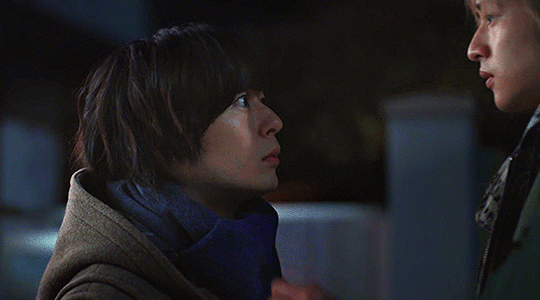

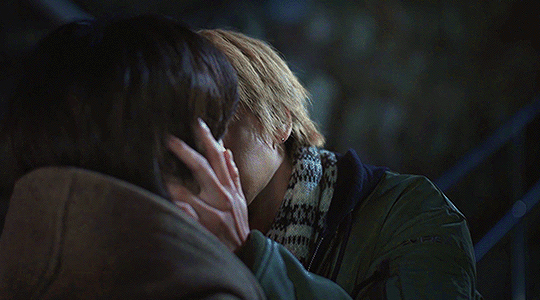

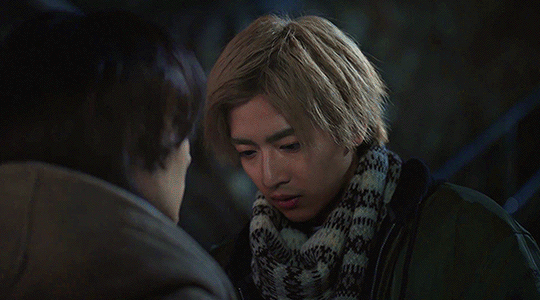
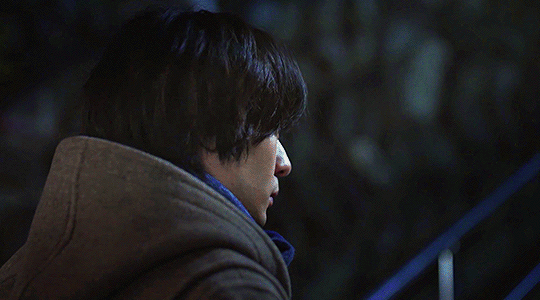
OUR DINING TABLE | EPISODE EIGHT
#bokura no shokutaku#our dining table#minoru x yutaka#yutaka x minoru#pain! :')#pain be upon you all.#mjtag#(sorry for the pain ;u;)#this took so much longer than i thought it would!! curse you dark scenes#rowan gifs#odt#if u noticed me come back 4 hours later and edit a caption on no u didn't#shh
368 notes
·
View notes
Text
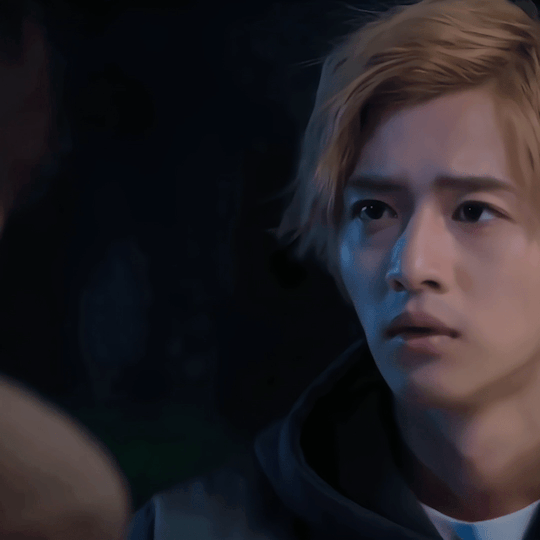



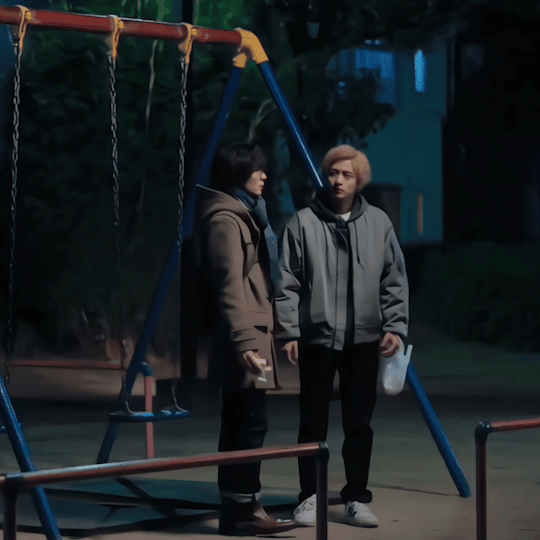
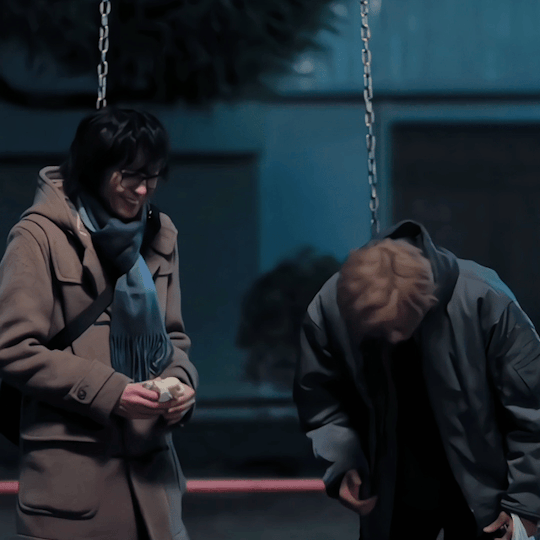
#you don't understand i love them and insane amount#watching this episode right after finishing star struck ep6 felt like a rollercoaster#i would give my life for them#minoru x yutaka#our dining table#bokura no shokutaku#lq gifs
230 notes
·
View notes
Text






BOKURA NO SHOKUTAKU (2023) *meat bun flavor after kiss* — episode 9
#bokura no shokutaku#our dining table#minoru x yutaka#jdramasource#userdramas#jdrama#bl drama#asiandramasource#asianlgbtqdramas#boyslovesource#dailyasiandramas#lextag#userstorge#userbon#userkimchi#usermare#connorjesup#belleparkgif#just look at minoru being his silliest self#smiling like a complete idiot in love the entire time#i love them both so much!!!! jhkskskd#hope this bring a little smile on your monday
294 notes
·
View notes
Text
I'm going to be honest and state that I still don't like Yutaka's family, but I find it interesting that he is the brightest in that room because he now has the Ueda family's love.

Very interesting.

See what love can do for you?

#the colors mean things#our dining table#bokura no shokutaku#minoru x yutaka#the brightest in the room
167 notes
·
View notes